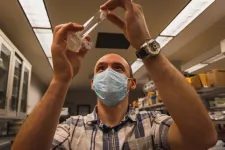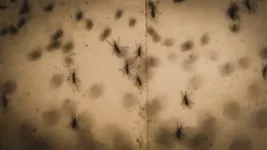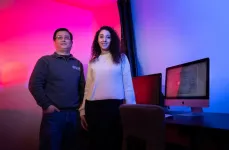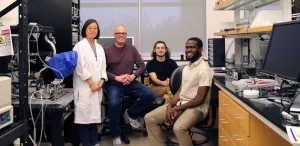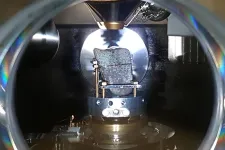(Press-News.org) Humans smell. Each and every person has a unique body odor.
People have been using commercial products to alter their scent for generations. From soaps to perfumes, people gravitate to floral and fruity smells.
Whether we think these smells are good or bad is of little consequence to mosquitoes, transmitters of diseases that kill hundreds of thousands of people each year. Additionally, mosquitoes rely on plant nectar to get some sugars needed to sustain their metabolism in addition to needing nutrients in the blood to produce eggs.
And humans with nutrients and a floral scent? That’s two strikes.
In spite of these scents being right under humans’ noses, the impact of soap smell on mosquito preference was largely ignored until Virginia Tech researchers in the College of Agriculture and Life Sciences asked this question.
And they found that certain soaps could make people more or less attractive to mosquitoes.
“Just by changing soap scents, someone who already attracts mosquitoes at a higher-than-average rate could further amplify or decrease that attraction,” said Clément Vinauger, an assistant professor of biochemistry and co-principal investigator on the proof-of-concept study alongside his collaborator Chloé Lahondère, also an assistant professor of biochemistry.
The research on mosquito soap interactions was published on May 10, 2023, in iScience and was funded in part by the United States Department of Agriculture and the National Institute of Food and Agriculture.
Hidden under human noses
The connection between soap and mosquito attractiveness was studied through four volunteers. First, the research team, comprised of Morgen VanderGissen, graduate student, Anaïs Tallon, a postdoctoral associate, in addition to Lahondère and Vinauger, studied the unique scent profile of each individual, unwashed and washed with each Dial, Dove, Native, and Simple Truth soaps.
According to Vinauger, more than 60 percent of what is smelled after washing comes from soap, rather than natural body odors.
“The other aspect is that it's not simply adding stuff to our body odor, but it's also replacing some chemicals while eliminating others, that are washed away,” Vinauger said. “So we think there is a lot of chemical interaction between our natural chemicals and soap chemicals.”
To test the interactions between smell, the researchers released mosquitoes in a meshed cage that had two cups containing odor extracts and gave them a choice – unwashed scents gathered from the individuals along with their washed scents. These were gathered from a nylon sleeve on the forearm with the body in both washed and unwashed states. Tests were repeated for the various combinations of scents.
“This way we can really measure and quantify the effect of the soap in terms of increasing or decreasing the attractiveness of the individual,” Vinauger said. “That's where we found that not all soaps have the same effect on all volunteers.”
In terms of fragrance preferences, three of the four soaps increased mosquito attractiveness while one decreased. All of the soaps had a fruity or flowery scent. The one that decreased attractiveness was coconut scented.
“That was very interesting for us because there is other evidence in the literature that elevating certain fatty acids, such as those found in coconut oil derivatives, could serve as a repellant for mosquitoes and other insects,” Vinauger said.
Odors are everywhere
With the results of the proof-of-concept study in hand, the research team hopes to expand the study with additional people and soap varieties to get a clearer understanding of the implications.
“Trying different soaps is important because we are showing that it's really the combination between your natural odor and a specific soap that matters,” Vinauger said. “We also need to study the duration of these effects. What if you shower in the morning? The evening? We need to answer these questions in our future work.”
Soap is only one part of the equation. Deodorants, laundry detergents, and other scented products could also play a factor.
While there is more work to be done, research shows that using coconut-scented soaps could reduce attractiveness to mosquitoes.
END
Virginia Tech researchers conduct proof-of-concept study on mosquito’s scent preferences
Using scented soaps, Virginia Tech researchers found that certain scents of body soaps could alter the scent profile of humans to make them more or less attractive to mosquitoes
2023-05-10
ELSE PRESS RELEASES FROM THIS DATE:
Older adults are more easily distracted, study reports
2023-05-10
RIVERSIDE, Calif. -- While engaged in a physical task requiring effort, such as driving a car or carrying grocery bags, older adults are more likely than younger adults to be distracted by items irrelevant to the task at hand, a University of California, Riverside, study reports.
The study assessed the interaction between physical exertion and short-term memory performance when distractors were present or absent in younger and older adults.
“Action and cognition, which interact often in daily life, are sensitive to the effects of aging,” said graduate student Lilian Azer, the first author of the research paper published ...
Texas A&M Institute for Advancing Health through Agriculture seeks experts to support study on responsive agriculture
2023-05-10
College Station, Texas (May 10, 2023) – Texas A&M’s Institute for Advancing Health Through Agriculture (IHA) is spearheading a study that focuses on advancing the concept of responsive agriculture and is seeking experts and leaders in the agriculture-food value chain to serve one of its three committees. The committees, along with a recently named Task Force, will help develop a road map to achieve responsive agriculture, an agricultural system and food environment that supports health ...
How does the brain interpret taste?
2023-05-10
NORMAN, OKLA. – Taste is a complex neurological experience that has the potential to provide extensive, and perhaps surprising, information on how the brain makes sense of sensations and the organization of brain pathways. A research project funded by the National Institutes of Health, led by Christian H. Lemon, Ph.D., an associate professor in the Department of Biology in the Dodge Family College of Arts and Sciences, aims to better understand how the brain processes taste and how those neural pathways can evolve.
Taste ...
ACM and CSTA announce 2022-2023 Cutler-Bell student winners
2023-05-10
The Association for Computing Machinery (ACM) and the Computer Science Teachers Association (CSTA) announced four high school students were selected from among a pool of graduating high school seniors throughout the US for the ACM/CSTA Cutler-Bell Prize in High School Computing. Eligible students applied for the award by submitting a project/artifact that engages modern technology and computer science. A panel of judges selected the recipients based on the ingenuity, complexity, relevancy, and originality of their projects.
The Cutler-Bell Prize promotes ...
Abdominal aortic aneurysm: new treatment may reduce size; COVID infection may speed growth
2023-05-10
Research Highlights
Abdominal aortic aneurysm, a weakening and ballooning of the aorta, the largest blood vessel in the body, may result in a life-threatening rupture.
In a small, preliminary study examining a potential treatment to keep small abdominal aortic aneurysms from growing to a dangerous size, intravenous administration of immune-modulating cells resulted in a significant decrease in pro-inflammatory cells, and with higher doses, there was a decrease in aneurysm size.
In a separate small study, people with abdominal aortic aneurysms ...
Detecting neutrinos from nuclear reactors with water
2023-05-10
The Science
Neutrinos are subatomic particles that interact with matter extremely weakly. They are produced in many types of radioactive decays, including in the core of the Sun and in nuclear reactors. Neutrinos are also impossible to block—they easily travel from the core of a nuclear reactor to a detector far away, and even through the Earth itself. Detecting the tiny signals from neutrinos therefore requires huge devices that are extremely sensitive. The SNO+ experiment has just shown that a detector filled with simple water can still detect reactor neutrinos, even though the neutrinos create only tiny signals in the detector.
The ...
When A.I. discloses personal information, users may empathize more
2023-05-10
In a new study, participants showed more empathy for an online anthropomorphic artificial intelligence (A.I.) agent when it seemed to disclose personal information about itself while chatting with participants. Takahiro Tsumura of The Graduate University for Advanced Studies, SOKENDAI in Tokyo, Japan, and Seiji Yamada of the National Institute of Informatics, also in Tokyo, present these findings in the open-access journal PLOS ONE on May 10, 2023.
The use of A.I. in daily life is increasing, raising interest in factors that might contribute to the level of trust and acceptance people feel towards A.I. agents. Prior research has suggested that people are ...
Bird and bat deaths at wind turbines increase during species’ seasonal migrations
2023-05-10
Bird and bat fatalities at wind turbines increase during seasonal migrations – information which could aid their protection, according to a study published May 10, 2023 in the open-access journal PLOS ONE by John D. Lloyd from the Renewable Energy Wildlife Institute of Washington DC, USA, and colleagues.
While there have been local and regional studies on bird and bat deaths caused by wind turbines, this study looks at data from 248 wind turbine facilities across the United States—almost 30 percent ...
Copper artefacts reveal changing connections in prehistoric Europe
2023-05-10
The geochemistry of copper artefacts reveals changes in distribution networks across prehistoric Europe, according to a study published May 10, 2023 in the open-access journal PLOS ONE by Jan Piet Brozio of Kiel University, Germany and colleagues.
Early copper artefacts are considered to have a high cultural and historical significance in European prehistory, but limited information exists about how copper was used and distributed in Neolithic Europe. In this study, the authors analyzed 45 copper objects, including axes, chisels, and other items, from various sites dating to the 4th and 3rd millennia BC of Northern Central Europe and Southern ...
Pregnant and lactating dogs share patterns of some blood metabolites - including glucose and fatty acid concentrations - with pregnant women, according to study of 27 dogs representing 21 breeds
2023-05-10
Article URL: https://journals.plos.org/plosone/article?id=10.1371/journal.pone.0284570
Article Title: Metabolomics during canine pregnancy and lactation
Author Countries: Switzerland, Germany, Finland
Funding: The costs were covered by the Freie Universitaet Berlin (examination, sampling) without any specific funding and PetBiomics Ltd provided material support (Analyses). PetBiomics Ltd employee Claudia Ottka and PetBiomics Ltd chairman Hannes Lohi were involved in the analysis and the preparation of the manuscript. The funders had no role in study design, data collection and decision to publish. END ...
LAST 30 PRESS RELEASES:
Prolonged drought linked to instability in key nitrogen-cycling microbes in Connecticut salt marsh
Self-cleaning fuel cells? Researchers reveal steam-powered fix for ‘sulfur poisoning’
Bacteria found in mouth and gut may help protect against severe peanut allergic reactions
Ultra-processed foods in preschool years associated with behavioural difficulties in childhood
A fanged frog long thought to be one species is revealing itself to be several
Weill Cornell Medicine selected for Prostate Cancer Foundation Challenge Award
Largest high-precision 3D facial database built in China, enabling more lifelike digital humans
SwRI upgrades facilities to expand subsurface safety valve testing to new application
Iron deficiency blocks the growth of young pancreatic cells
Selective forest thinning in the eastern Cascades supports both snowpack and wildfire resilience
A sea of light: HETDEX astronomers reveal hidden structures in the young universe
Some young gamers may be at higher risk of mental health problems, but family and school support can help
Reduce rust by dumping your wok twice, and other kitchen tips
High-fat diet accelerates breast cancer tumor growth and invasion
Leveraging AI models, neuroscientists parse canary songs to better understand human speech
Ultraprocessed food consumption and behavioral outcomes in Canadian children
The ISSCR honors Dr. Kyle M. Loh with the 2026 Early Career Impact Award for Transformative Advances in Stem Cell Biology
The ISSCR honors Alexander Meissner with the 2026 ISSCR Momentum Award for exceptional work in developmental and stem cell epigenetics
The ISSCR honors stem cell COREdinates and CorEUstem with the 2026 ISSCR Public Service Award
Minimally invasive procedure effectively treats small kidney cancers
SwRI earns CMMC Level 2 cybersecurity certification
Doctors and nurses believe their own substance use affects patients
Life forms can planet hop on asteroid debris – and survive
Sylvia Hurtado voted AERA President-Elect; key members elected to AERA Council
Mount Sinai and King Saud University Medical City forge a three-year collaboration to advance precision medicine in familial inflammatory bowel disease
AI biases can influence people’s perception of history
Prenatal opioid exposure and well-being through adolescence
Big and small dogs both impact indoor air quality, just differently
Wearing a weighted vest to strengthen bones? Make sure you’re moving
Microbe survives the pressures of impact-induced ejection from Mars
[Press-News.org] Virginia Tech researchers conduct proof-of-concept study on mosquito’s scent preferencesUsing scented soaps, Virginia Tech researchers found that certain scents of body soaps could alter the scent profile of humans to make them more or less attractive to mosquitoes
